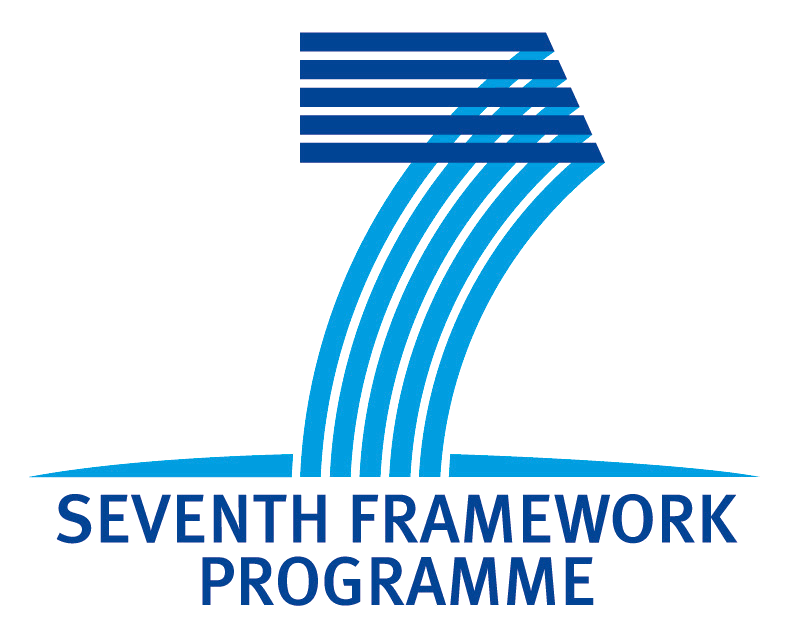MOLTO 4th Project Meeting - Demos
Planned demonstrations for the Open Day will take place in the lecture hall, in parallel with the afternoon coffee break and informally continue between 17:00-18:00 in the cafeteria. Demo presenters will be recognizable by a denim clip on their badge.
Here below short descriptions of the demonstrations.
Web IDE for GF by Thomas Hallgren
 |
Translation systems in MOLTO are based on multilingual grammars written in GF
(Grammatical Framework). The traditional environment available to GF grammar
developers consist of the GF command shell, a generic text editor and the GF
documentation. This is a simple and effective environment for the experienced
grammar developer. To better support less experienced grammar developers, one of
the goals of the MOLTO project is to create an IDE (Integrated Development
Environment) for GF grammar development.
We will show a prototype of a web-based grammar development environment that provides the same core functionalities as the traditional environment: grammar editing, grammar compilation, error detection, testing and visualization. It enables the creation of web-based translation systems without installation of any software and thus gives quick access to GF to novice and occasional users. |
GF Eclipse plugin: tools for the grammars developers by John Camilleri
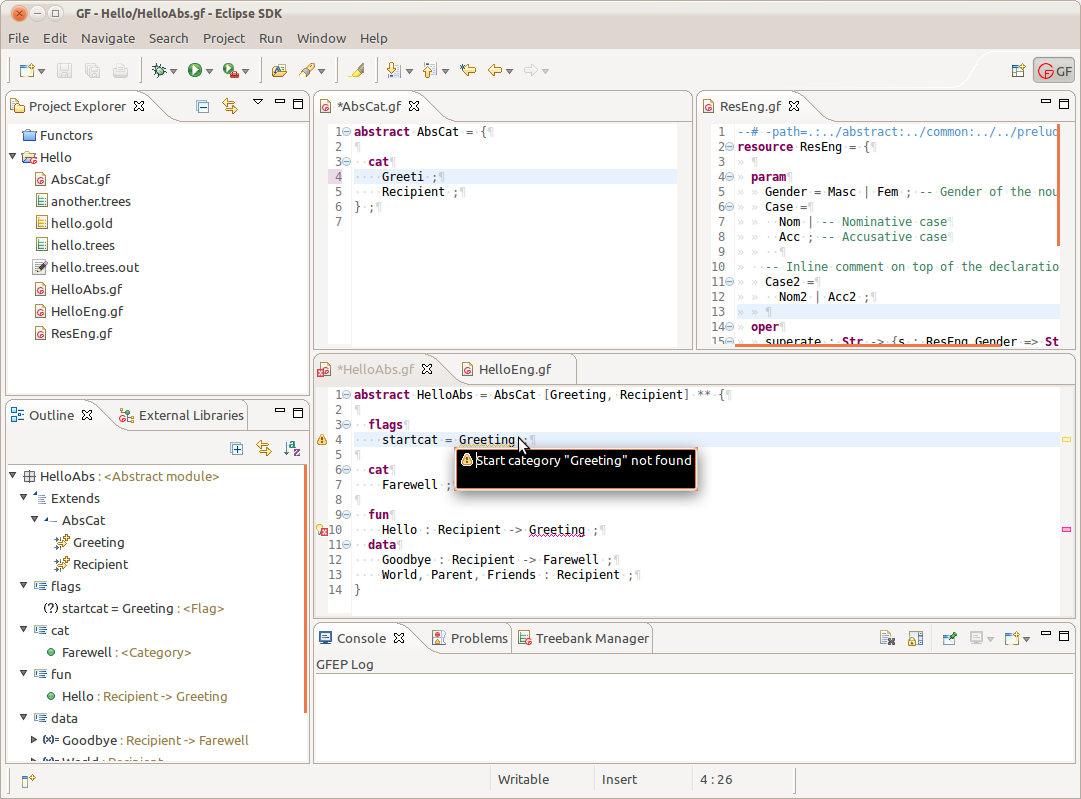 |
GF grammar development tends to take place in simple text editors and terminal shells. This project attempts to provide a high-level integrated development environment (IDE) specifically tailored for GF grammar-writing. Based on the Eclipse platform, we provide not only real-time syntax checking, but also automatic code formatting, import-aware auto-complete suggestions, cross-reference resolution, inline contextual documentation, "New Module" wizards, external library browsing, launch shortcuts to the GF shell, and a visual tool for running treebank test suites. These new, powerful, time-saving development tools are aimed at both new users and GF veterans alike. http://www.grammaticalframework.org/eclipse/ http://www.molto-project.eu/node/1395 |
MOLTO Phrasebook by Shafqat Virk and/or Aarne Ranta
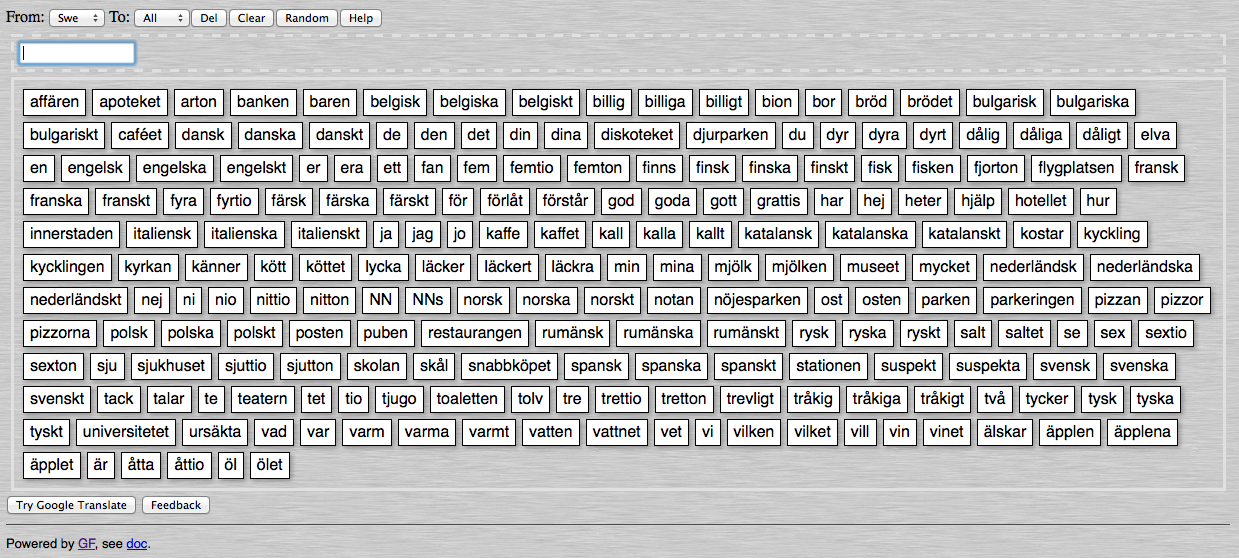 |
Controlled natural languages are controlled subsets of natural languages, which are normally used in technical domains. The purpose of these languages is to reduce the complexity involved in natural languages, and to eliminate the ambiguity. The users of these languages are experts within their domain, and are trained to use these languages. The Phrasebook is one such controlled natural language, whose domain is that of touristic phrases. It covers travel phrases such as "this fish is delicious", "how far is the airport from the hotel" in 17 languages. The objective is to produce high quality translations of the touristic phrases, and targets the audience consisting of everyday users rather than technical experts. It is available both on the web and as a stand-alone Android application, the PhraseDroid. http://www.grammaticalframework.org/demos/phrasebook/ https://market.android.com/details?id=org.grammaticalframework.android.a... |
GFSage by Jordi Saludes
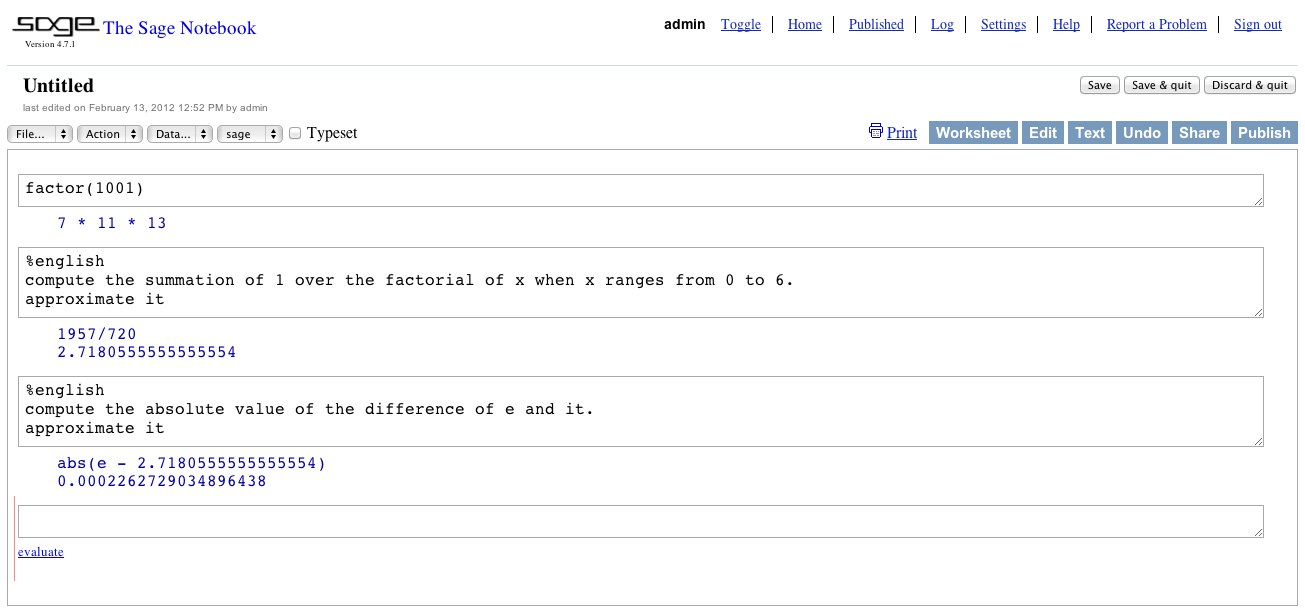 |
Using GF we can command a CAS (Computer Algebra System) using natural language and have the answers rendered in natural language too. We'll demonstrate it for an open source CAS named Sage. First, having Sage as a component of a dialog system. Second, by installing the natural language interface inside the Sage shell. |
MOLTO Patent retrieval prototype by Milen Chechev
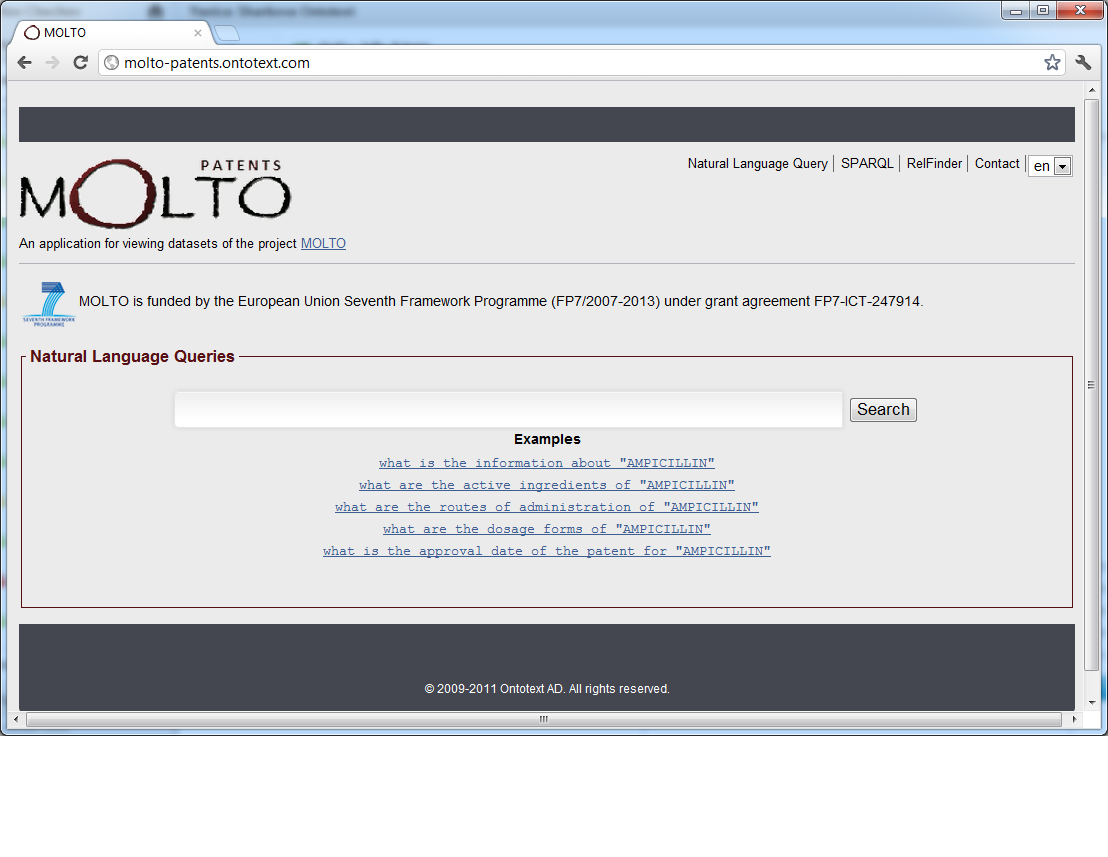 |
This demo present the patents retrieval prototype developed within the MOLTO project. The prototype aims to provide a multilingual natural language interface for querying the patent documents. The developed system is focused on the biomedical and pharmaceutical domain and includes the translation of the patent claims and abstracts into English and French. The online interface allows to browse the retrieved patents and shows the semantic annotations that can be used for explanation why any particular patent has matched the user's criteria. http://molto-patents.ontotext.com |
Global sight translation system by Lauri Carlson
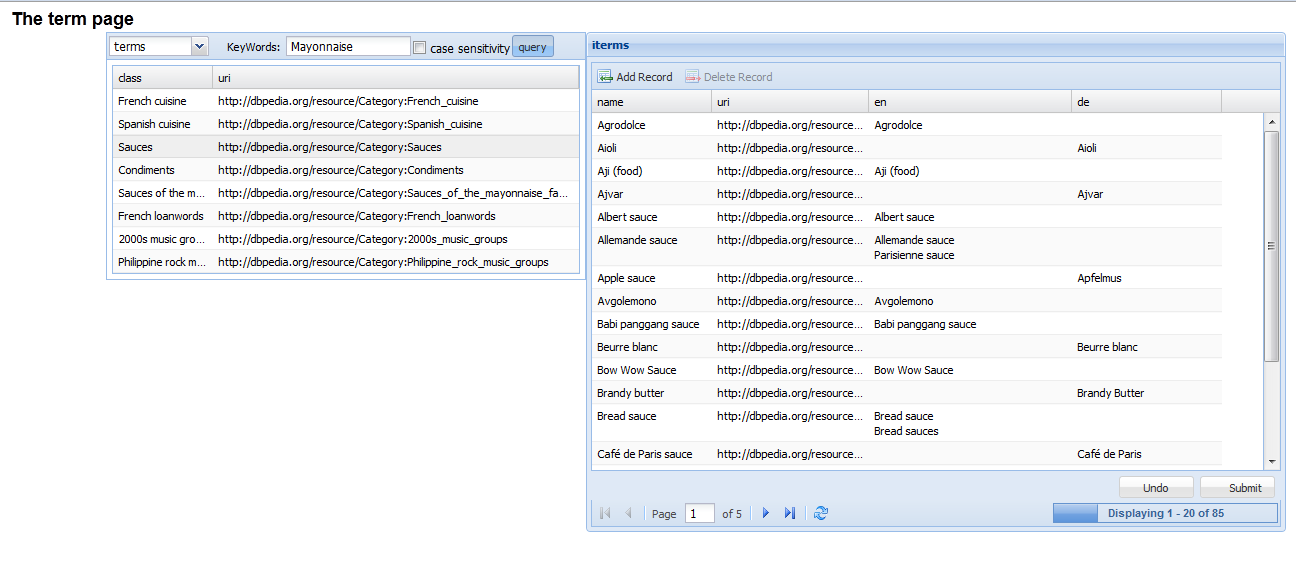 |
This demo shows the embedding of MOLTO translation tools to GlobalSight, a translation platform. MOLTO tools are designed with a focus only on translation. GlobalSight is an open source translation management platform, which provides the infrastructure needed in a professional translation project. |
MOLTO translation editor and equivalence editor by Inari Listenmaa and Chunxiang Li
 |
We show the user interface for fetching terms from the FactForge ontology. This search will be embedded in the MOLTO translation editor, and it will be connected to TermFactory database, in order to import and export terms in TermFactory. |
MOLTO Ontology editor by Lauri Carlson, if it is ready in time
 |
This demo shows a Mediawiki based ontology editor on TermFactory. |
OntoR: ontology extraction system by Seppo Nyrkkö
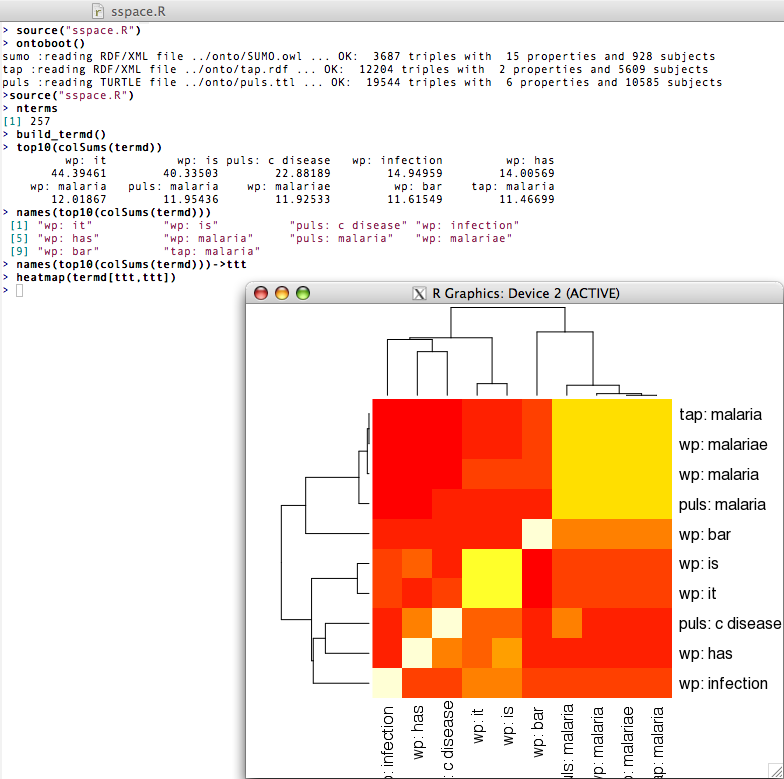 |
The demo presents a semi-supervised machine learning process, where new term dictionary candidates may be found in given text, by finding "closest matches" in previously known _ontologies_ (i.e. hierarchical vocabulary, term structure, usually industry or domain specific). We show how a corpus-harvested new term can be _aligned_ with its closest matches in an prior existing term ontology. New term's functional and semantic environment is analyzed, and the feature variables extracted are compared to values of previously known terms. The user is given the supervision control to decide the best alignment match and thus refine the ontology incrementally. |
AceWiki with GF by Kaarel Kaljurand
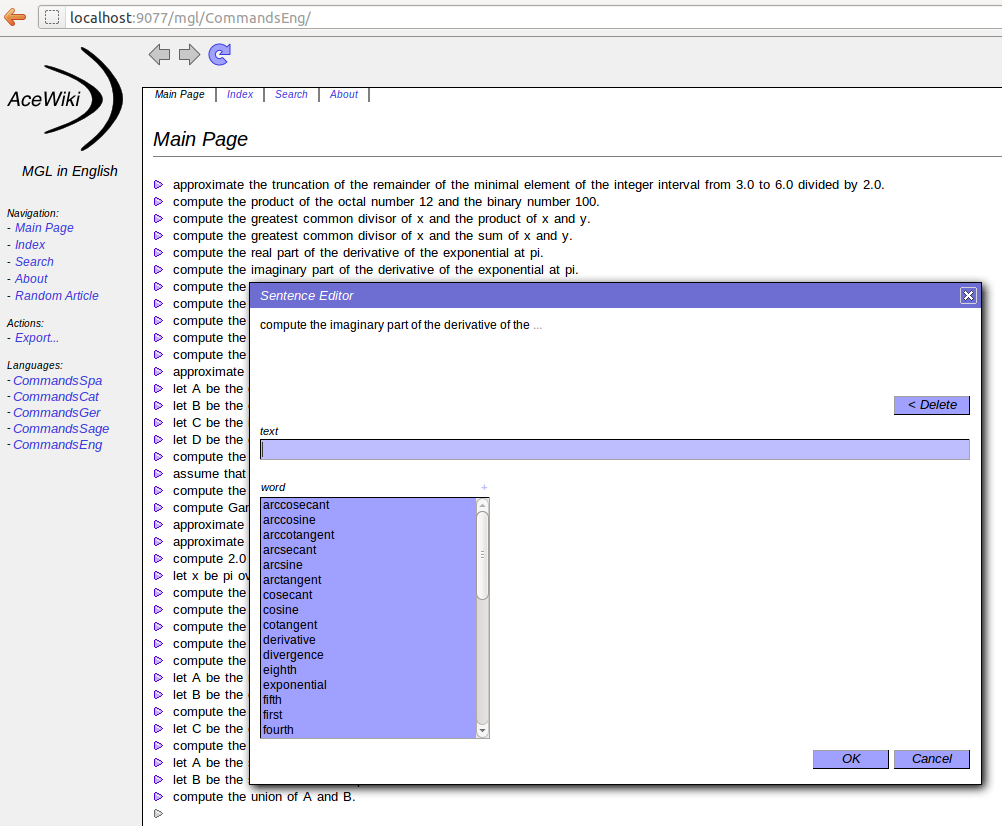 |
We show the AceWiki software that enables user-friendly collaborative building of highly expressive semantic wikis, and explain its role in the MOLTO project. We show the demo wikis available online at the AceWiki website, and also the preliminary integration of GF-based multilingual editing. |
New Audiences for Ontologies by Joris van Aart
 |
Be Informed will demo a first prototype of natural language based interfaces to its tools. Be Informed enables its customers to model the different aspects of their business in ontologies, and use these ontologies throughout the policy making lifecycle. This ranges, for instance, from drafting product models to offering the supporting services when selling models to customers and/or citizens. You will get a good idea of the kind of models that will be verbalized using MOLTO tools and the type of functionality we will be able to add to our products based on an advanced, multilingual verbalization capability as we will develop in WP12 of the MOLTO Project. |
What links here
No backlinks found.


